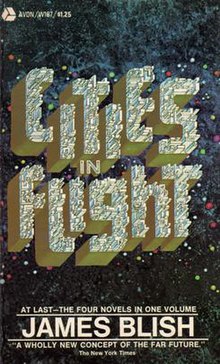Cities in Flight

Cover of the first omnibus edition, 1970.
|
|
| Author | James Blish |
|---|---|
| Country |
|
| Language | English |
| Genre | Science fiction, Adventure fiction |
|
Publication date
|
1955 to 1962 |
| Media type | |
Cities in Flight is a four-volume series of science fiction stories by American writer James Blish, originally published between 1950 and 1962, which were first known collectively as the "Okie" novels. The series features entire cities that are able to fly through space using an anti-gravity device, the spindizzy. The stories cover roughly two thousand years, from their very near future to the end of the universe. One story, "Earthman, Come Home" won a Retro Hugo Award in 2004 for Best Novelette. Since 1970, the primary edition has been the omnibus volume first published in paperback by Avon Books. Over the years James Blish made many changes to these stories in response to points raised in letters from readers.
They Shall Have Stars (1956) (also published under the title Year 2018!), incorporating the stories "Bridge" and "At Death's End", is set in the near future (the book begins in 2013). In this future, the Soviet Union still exists and the Cold War is still ongoing. As a result, in the West, civil liberties have been eroded more and more, until society eventually resembles the Soviet model. Alaska's Senator Bliss Wagoner, head of the Joint Congressional Committee on Space Flight, is determined to do something about it.
Scientific research has stagnated, mainly because knowledge has become restricted. On the advice of scientist Dr. Corsi, Wagoner concentrates his attention on fringe science theories. One project he has funded is the building of a "bridge" made of Ice IV on the surface of Jupiter to make measurements. This leads to one of two major discoveries which make interstellar space travel feasible: gravity manipulation (nicknamed the "spindizzy"), which leads to both a faster-than-light travel and effective shielding. Another project yields an "anti-agathic" drug, which stops aging. Wagoner is eventually convicted of treason by an oppressive regime, but not before he has sent out expeditions (in a later book, it is revealed that they succeed in establishing thriving colonies). Politically, the book clearly expresses a strong opposition to McCarthyism, at its peak during the time of writing.
...
Wikipedia
